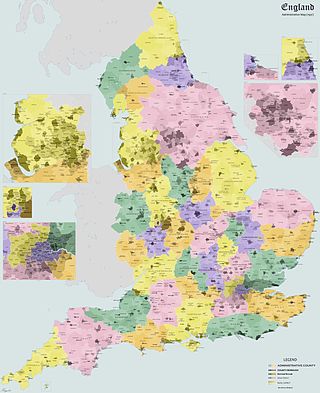
A borough is an administrative division in various English-speaking countries. In principle, the term borough designates a self-governing walled town, although in practice, official use of the term varies widely.

Municipal boroughs were a type of local government district which existed in England and Wales between 1835 and 1974, in Northern Ireland from 1840 to 1973 and in the Republic of Ireland from 1840 to 2002. Broadly similar structures existed in Scotland from 1833 to 1975 with the reform of royal burghs and creation of police burghs.
A county corporate or corporate county was a type of subnational division used for local government in England, Wales, and Ireland.

The Municipal Corporations Act 1835, sometimes known as the Municipal Reform Act, was an Act of the Parliament of the United Kingdom that reformed local government in the incorporated boroughs of England and Wales. The legislation was part of the reform programme of the Whigs and followed the Reform Act 1832, which had abolished most of the rotten boroughs for parliamentary purposes.
A municipal corporation is the legal term for a local governing body, including cities, counties, towns, townships, charter townships, villages, and boroughs. The term can also be used to describe municipally owned corporations.
Sanitary districts were established in England and Wales in 1872 and in Ireland in 1878. The districts were of two types, based on existing structures:

The Municipal Corporations Act (Ireland) 1840, An Act for the Regulation of Municipal Corporations in Ireland, was passed by the Parliament of the United Kingdom on 10 August 1840. It was one of the Municipal Corporations (Ireland) Acts 1840 to 1888.
The Municipal Corporations Act 1835 reformed 178 existing boroughs. It also allowed for further towns to submit petitions for the grant of a charter of incorporation as a municipal borough. There were 62 such incorporations before the 1835 act was repealed and replaced by the Municipal Corporations Act 1882.

The Municipal Corporations Act 1882 is an Act of the Parliament of the United Kingdom. It replaced existing legislation governing municipal boroughs in England and Wales, and gave the corporations powers to make bylaws and to acquire land and buildings. Municipal boroughs continued to be regulated by the Act until their abolition in 1974. Parts of the Act are still in operation. Sections 190 to 194 were amongst the enactments cited as the Police Acts 1839 to 1893.
The following is a list of towns in England and Wales which were granted charters of incorporation conferring borough status under the Municipal Corporations Act 1882 or the Local Government Act 1933.
Town commissioners were elected local government bodies that existed in urban areas in Ireland from the 19th century until 2002. Larger towns with commissioners were converted to urban districts by the Local Government (Ireland) Act 1898, with the smaller commissions continuing to exist beyond partition in 1922. The idea was a standardisation of the improvement commissioners established in an ad-hoc manner for particular towns in Britain and Ireland in the eighteenth century. The last town commissioners in Northern Ireland were abolished in 1962. In the Republic of Ireland, the remaining commissions became town councils in 2002, and abolished in 2014.
Borough status is granted by royal charter to local government districts in England, Wales and Northern Ireland. The status is purely honorary, and does not give any additional powers to the council or inhabitants of the district. In Scotland, similarly chartered communities were known as royal burghs, although the status is no longer granted.
The history of local government in England is one of gradual change and evolution since the Middle Ages. England has never possessed a formal written constitution, with the result that modern administration is based on precedent, and is derived from administrative powers granted to older systems, such as that of the shires.

The Honorary Freedom of Boroughs Act 1885 was an Act of the Parliament of the United Kingdom that gave the councils of municipal boroughs in England and Wales the power to award the title of honorary freeman to "persons of distinction and any persons who have rendered emininent services to the borough".

The Short Titles Act 1896 is an Act of the Parliament of the United Kingdom. It replaces the Short Titles Act 1892.
In Ireland, the term city has somewhat differing meanings in Northern Ireland and the Republic of Ireland.

Buckingham was an ancient borough in England centred on the town of Buckingham in the county of Buckinghamshire, and was first recorded in the 10th century. It was incorporated as a borough in 1553/4 and reformed under the Municipal Corporations Act 1835. In 1974, it was abolished as part of local government re-organisation under the Local Government Act 1972, and absorbed by Aylesbury Vale District Council.
Municipal Corporations Act is a stock short title used in the United Kingdom for legislation relating to municipal corporations.
Liverpool Town Council existed from 1835 to 1880.

Garstang Town Hall is a municipal building in the High Street in Garstang, Lancashire, England. The structure, which currently accommodates two shops and a Royal British Legion Club, is a Grade II listed building.






